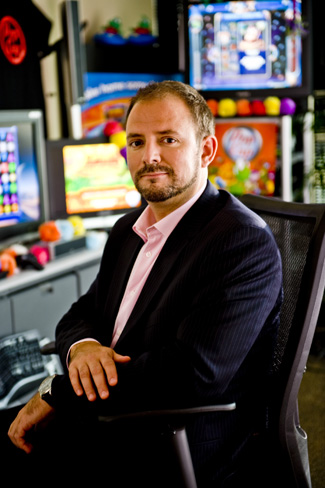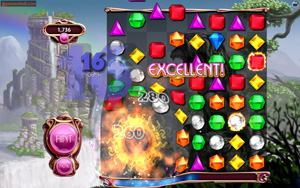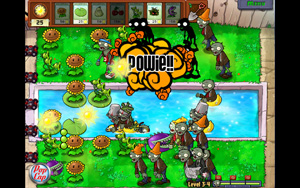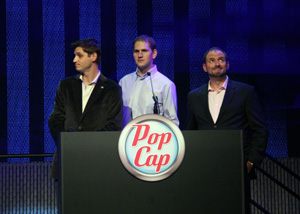Alumnus Jason Kapalka explains his evolution from aspiring novelist to a Bejeweled video-gaming kingpin.
"Bejeweled and Bookworm are my two addictions," admits Debbie Yee, '92 BA, of her two favourite iPhone video games. "I find I play them most when I'm waiting on the kids, husband or LRT. And not that I like to admit it, but I have stayed awake into the wee hours trying to beat my last score."
Debbie's not the only one to catch on to the casual video-gaming craze. It's estimated 200 million consumers-many of whom wouldn't label themselves "gamers"-play casual games online every month.
At the epicenter of this casual gaming revolution is Jason Kapalka, '92 BA, '94 MA, co-founder and chief creative officer of Seattle-based PopCap Games-which in its 10 years in business has created a menu of simple, accessible and non-committal video games for a broad audience including the Bejeweled series, Peggle, Zuma, Bookworm and Plants vs. Zombies.
"For a while, video games were trapped in a niche where only those with access to specialized, expensive, hard-to-master hardware were able to play them, and so the games ended up being built for this increasingly insular crowd of hardcore gamers," explains Kapalka.
The tech trendsetter has since helped turn the video gamer stereotype on its ear. Today, those "hardcore gamers"-willing to devote hours and hours of leisure time to complex story-driven games like Halo, Final Fantasy or World of Warcraft, for example-are dwindling. They've been replaced by an unexpected multitude, including commuting corporate execs, curiously tech-savvy three-year-olds, and once-gadget-shy retirees who-thanks to a market proliferation of laptop computers, mobile handsets and Apple's many devices-can pass the time playing a game whenever and wherever they happen to be.
Jason always hoped consumers would like PopCap's games, but he never imagined when he and his business partners, John Vechey and Brian Fiete, started the company in 2000, that three billion hours per year would be spent playing them.
"Casual video games are addictive for the same reason casual non-video games can be. Game-playing is just an innate human trait, I think. As for PopCap games specifically, we don't have a magic formula; we just try to make games that we enjoy ourselves."
As a kid, Jason admits he played a lot of video games himself.
"I remember playing a lot of Atari 2600 games over at a friend's house when I was 10 or 12-Space Invaders and PacMan-type games. And I was definitely of the generation who hung out at arcades. I'd take my allowance and go down to the arcade to play Defender and Gallaga."
Today, Jason cites complex story-driven titles like the Legend of Zelda series and Civilization as two of his favourite games-an interesting contrast to the style and tone of the games he now produces, though not difficult to believe given Jason's interests during his days at university.
An aspiring fiction writer who dreamed of composing the great Canadian novel, Jason completed his BA then a master's in English at the U of A. His thesis, titled "Lena the Scream Cleaner," was a collection of dark-themed short stories about "a cleaning woman whose job it is to cleanse human screams of their pain," recalls Jason's then-mentor and Professor Emeritus Greg Hollingshead, '81 PhD. Jason's creative endeavours marked his extracurricular activities, too, as he wrote and illustrated cartoons like "Space Moose" for The Gateway.
But, like most university students, Kapalka had to support himself, so he parlayed his way with words and continued love of video games into a freelance writing gig reviewing games for a column in San Francisco-based Computer Gaming World, the oldest and most respected PC gaming magazine.
"I did that for awhile, and then around '94, one of the editors of that magazine went to join a dot-com start-up in San Francisco, and he asked me to come down to work as an editor," recalls Kapalka.
Five years with Total Entertainment through the dot-com boom was an interesting education for Jason, whose job writing editorial materials to accompany games eventually evolved into creating concepts and producing original games.
In 2000, Jason and his two business partners embarked on their own business venture, establishing PopCap Games and launching a free downloadable game called Bejeweled Deluxe, in which three or more gemstones are matched on a grid to make them disappear. The game would reach blockbuster status, and, in 2004, was inducted into the Computer Gaming Hall of Fame-the only puzzle game other than Tetris to receive the distinction. Today, Bejeweled is one of the best-known casual games on the planet, akin to Microsoft's Solitaire.
"I had a meeting with Mark Zuckerberg [Facebook founder], and when he heard that we created Bejeweled, the first thing he said was 'Oh yeah! I played that in high school!' says Kapalka. "So there's a whole generation for whom Bejeweled might have been their Tetris equivalent."
Among PopCap's successes since then is the wildly popular Plants vs. Zombies-a tower defense game where a homeowner uses a variety of plants to repel an army of zombies. Plants vs. Zombies is the fastest-selling video game PopCap has created to date, and was named Apple's best game of the year for iPod and iPod Touch.
PopCap's games have been featured in world championship gaming competitions and spawned fanatics like Sara Ureshii, a Madison, Wisconsin, woman who loves Bejeweled so much that she's tattooed a half-dozen of the game's trademark jewels on her wrists and arms. Even a pair of schoolteachers in Oregon have embraced a concept once thought to be the enemy of education and have incorporated the use of Bookworm into their curriculum in an effort to better engage students and develop their reading and vocabulary skills. Some medical professionals, too, turn to casual video games as a form of patient therapy activity and rehab.
Though PopCap makes no claims as to the impact of their games on players' health or education, Jason is happy to hear that his work is enjoyed by a wide variety of people.
"It's a nice feeling to know that we've had even a minor impact on making people's lives a little bit better by entertaining them," says Kapalka.
And although Jason and his partners' successes with PopCap have landed them on the list of top Internet millionaires, Jason isn't one to rest on his laurels.
"Over the years we've had a lot of competitors and rivals, and a lot of them are now defunct or very obscure. Just because you have success today, doesn't mean that it's necessarily going to continue tomorrow," says Kapalka. "You have to keep innovating and working hard to remain relevant. If you get complacent, you become a footnote in this industry."
As for what's next for PopCap, Jason and his partners just finalized a deal with video game giant Electronic Arts, who also acquired Edmonton-based Bioware in 2009.
"EA gives us a scale we could never have achieved on our own, with access to resources we've never had before," Jason explains. "Our goal is to be a studio on par with EA's other flagship brands, like Bioware, DICE, EA Sports and The Sims. We're more likely to stick with casual/social/mobile games than to drift into Bioware's story-driven game territory."
So with his business expanding and growing more than ever, does Kapalka still aspire to write that great Canadian novel?
"I had my start as a writer and I have a dream of doing some fiction writing," says Jason, "but I'll probably have to wait until I take a sabbatical. Or retire."




We at New Trail welcome your comments. Robust debate and criticism are encouraged, provided it is respectful. We reserve the right to reject comments, images or links that attack ethnicity, nationality, religion, gender or sexual orientation; that include offensive language, threats, spam; are fraudulent or defamatory; infringe on copyright or trademarks; and that just generally aren’t very nice. Discussion is monitored and violation of these guidelines will result in comments being disabled.